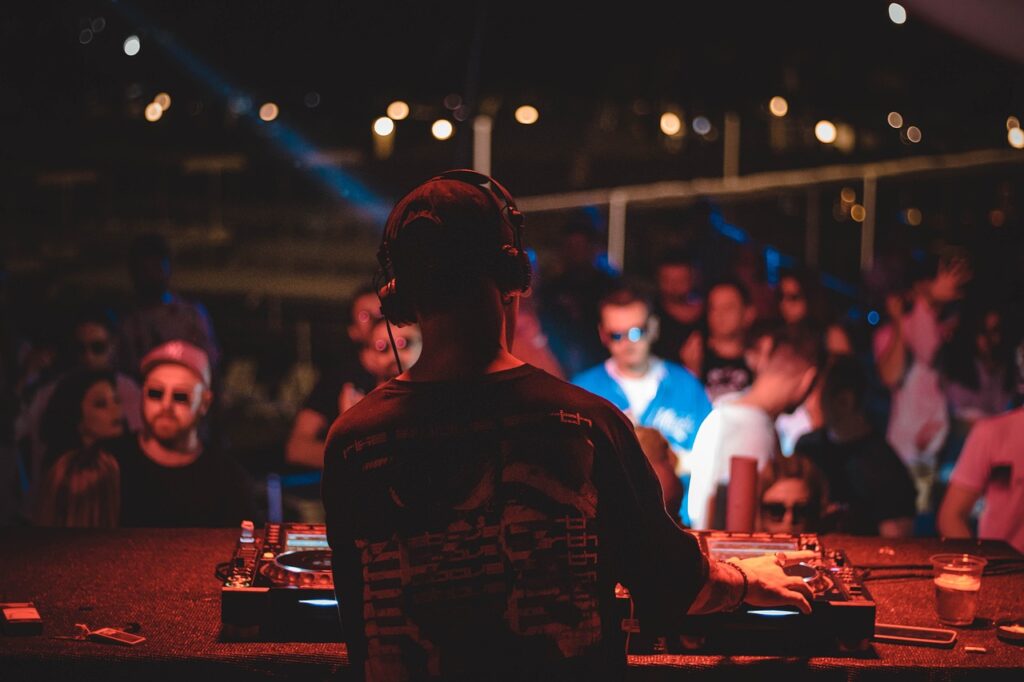
Intro
Are you a beginner DJ looking to get started in the music scene? DJing can be an exciting and rewarding hobby, but it can also be overwhelming if you don’t know where to start. One of the most important things you need to consider is the equipment you will need. In this guide, we will take you through the essential equipment you will need to get started, from mixers to headphones, speakers to microphones.
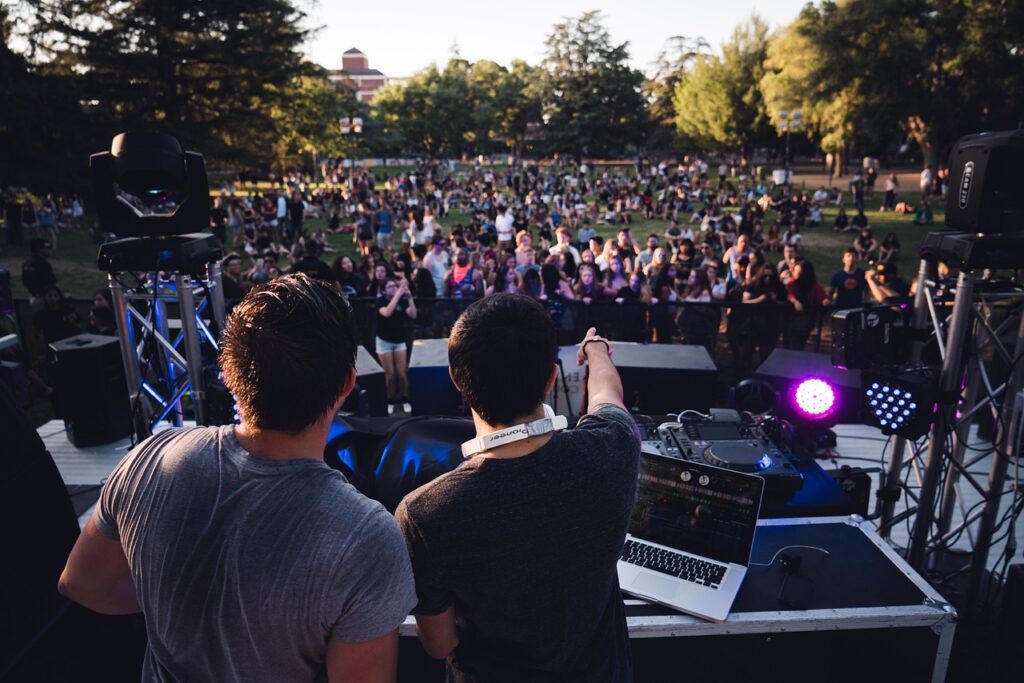
The Essential DJ Equipment: What You Can’t Do Without
Ready to start DJing but unsure what equipment you need? Let’s break it down for you! The first thing you’ll need is either a DJ controller or turntables. A controller is usually more beginner-friendly and budget-friendly, while turntables are more traditional and tactile. Keep in mind that turntables require a separate mixer, which can be pricier.
The mixer is the heart of your DJ setup. It allows you to blend and manipulate your tracks to create a seamless mix. Make sure to choose a mixer with all the features you need, like EQ, faders, and effects.
Headphones are a must-have for beatmatching, the process of matching the beats of two tracks together. Look for headphones that offer accurate sound reproduction and block out external noise. Comfort is also crucial, since you’ll be wearing them for long periods while DJing.
Speakers are where the sound comes out, so it’s important to choose the right ones for your setup. Active speakers have built-in amplifiers, while passive speakers require a separate amplifier. Make sure to look for speakers that reproduce sound accurately without any added colouration.
Lastly, don’t forget about DJ furniture! A sturdy table or desk will provide a stable surface for your equipment. You may also want to invest in a DJ stand or laptop stand to raise your equipment to the right height.
There you have it, the essential DJ equipment you can’t do without! Remember, while investing in quality gear is important, don’t forget to have fun and let your creativity shine through your music.
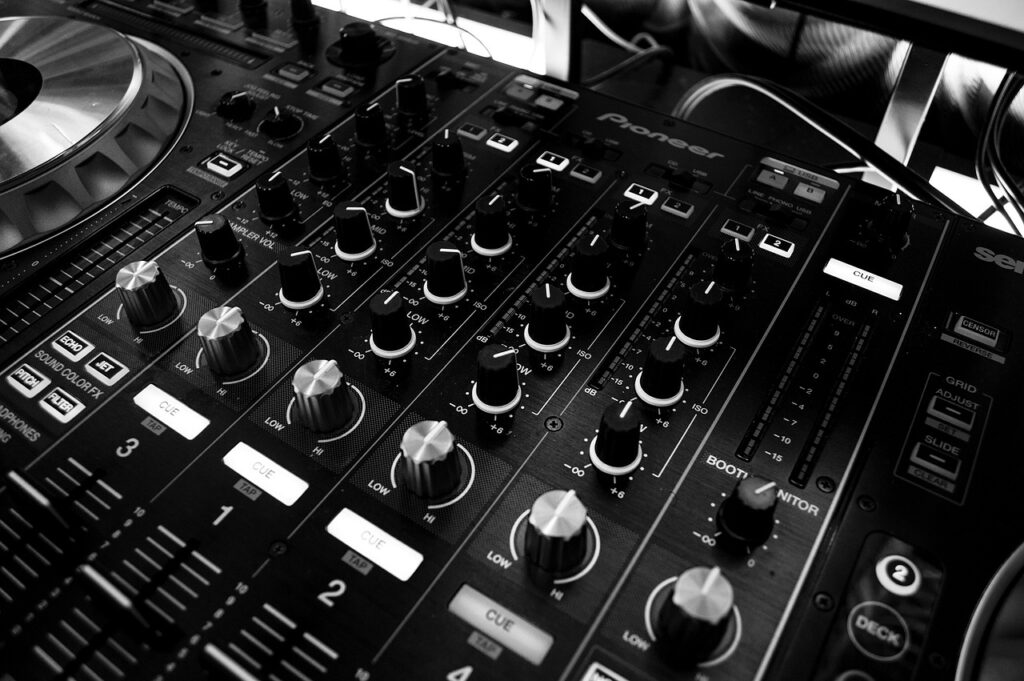
The Mixer: Your Creative Canvas
Now that you have your DJ controller or turntables, it’s time to talk about the mixer. This piece of equipment is the key to blending and manipulating your tracks to create the perfect mix. Think of it as your creative canvas!
When choosing a mixer, make sure to look for one that has all the features you need. This includes EQ, faders, and effects. EQ stands for equalization, which allows you to adjust the levels of different frequencies in a track. Faders are the sliding controls that adjust the volume of each track, while effects add a variety of sound manipulations like reverb, echo, and more.
You can choose between standalone mixers or those that are built into your DJ controller. The choice is ultimately up to you and your preferences. If you opt for a standalone mixer, make sure to choose one that has enough channels to accommodate your setup.
When you start using your mixer, take some time to experiment with the different features. See what sounds good and what doesn’t. Don’t be afraid to try out different effects or EQ settings. Remember, the mixer is your tool to express your creativity and style as a DJ.
As you get more comfortable with your mixer, you’ll start to develop your own mixing style. This can be anything from smooth transitions between tracks to sudden changes in tempo. The possibilities are endless, and your mixer is the tool that makes it all possible.
So there you have it, the mixer is an essential part of your DJ setup and your creative canvas. Take your time to choose the right one, and don’t forget to have fun exploring all the different features!

Headphones: Essential Gear for Beatmatching
One of the most important pieces of equipment you’ll need as a beginner DJ is a good pair of headphones. Not just any headphones, though. You need headphones that are specifically designed for DJing, with accurate sound reproduction and a closed-back design to block out external noise.
Beatmatching is a crucial part of DJing, and it’s where your headphones come in. Beatmatching is the process of matching the beats of two tracks together, and it’s essential to creating a seamless mix. Your headphones allow you to listen to both tracks at the same time and make sure they’re perfectly synced.
When choosing your headphones, there are a few things to keep in mind. Comfort is important, as you’ll be wearing them for long periods while DJing. Look for headphones that are lightweight and have padding on the ear cups and headband.
You should also consider the size of the ear cups. Larger ear cups provide better sound isolation, but they can be less comfortable to wear for long periods. On-ear headphones are smaller and more portable, but they may not block out as much external noise.
Finally, don’t forget about the cable. Look for headphones with a long, coiled cable that won’t get tangled or caught on anything while you’re DJing. A detachable cable is also a plus, as it allows you to replace the cable if it gets damaged.
Overall, your headphones are an essential piece of equipment for beatmatching and creating a seamless mix. Choose a pair that is comfortable, has accurate sound reproduction, and a closed-back design. With the right headphones, you’ll be able to create a seamless mix that will get the party started!
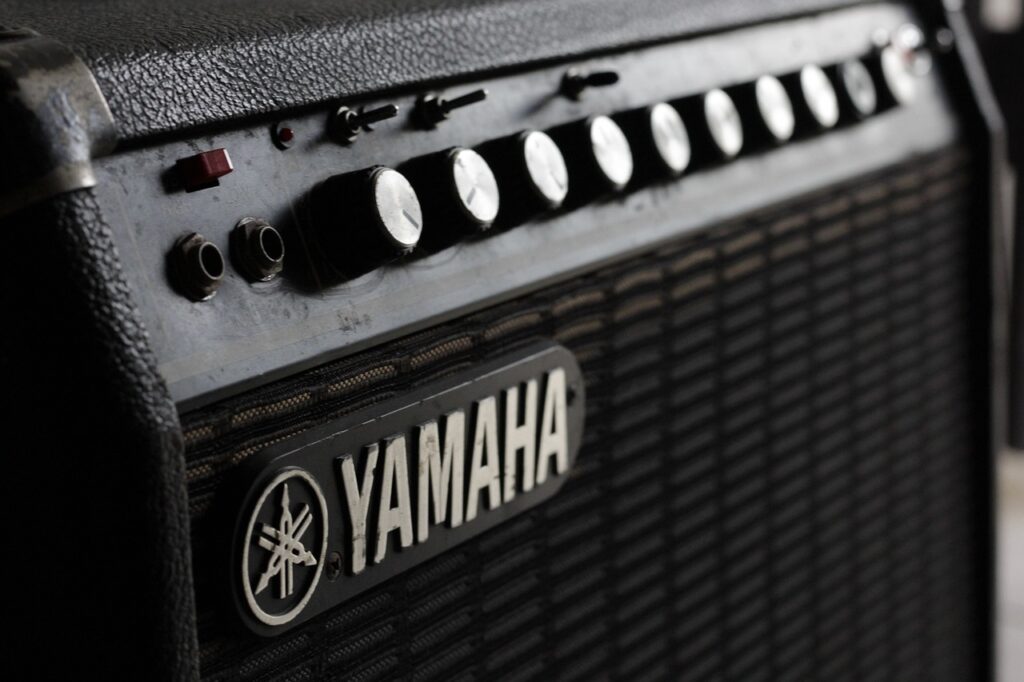
The Speakers: All about the Sound
Now, let’s talk about the speakers, the essential part of your DJ setup that brings your music to life! Whether you’re playing to a small crowd or a large one, you want your music to sound clear and powerful. Active speakers are a good choice for beginners, as they have built-in amplifiers, which means you don’t need a separate amplifier. Passive speakers require a separate amplifier, which can be more expensive.
When choosing your speakers, look for ones that provide a flat frequency response. This means they reproduce sound accurately without any added colouration. You want your music to sound exactly how it was intended, without any added bass or treble.
Also, consider the size of the speakers. Larger speakers can provide more bass, but they can be less portable. Smaller speakers may be more portable, but they may not have the same power and depth of sound. It’s all about finding the right balance for your needs.
Placement of the speakers is also important. Make sure to position them at ear level for optimal sound quality. This can be achieved by using stands or elevating them on a table or shelf.
Finally, don’t forget about cables. Look for high-quality cables that are long enough to reach your mixer or controller. You want cables that are durable and won’t get tangled or damaged easily.
Overall, your speakers are a crucial part of your DJ setup. Look for active speakers with a flat frequency response, and make sure to position them correctly for optimal sound quality. With the right speakers, you’ll be able to deliver a memorable and powerful performance that will get the crowd moving!
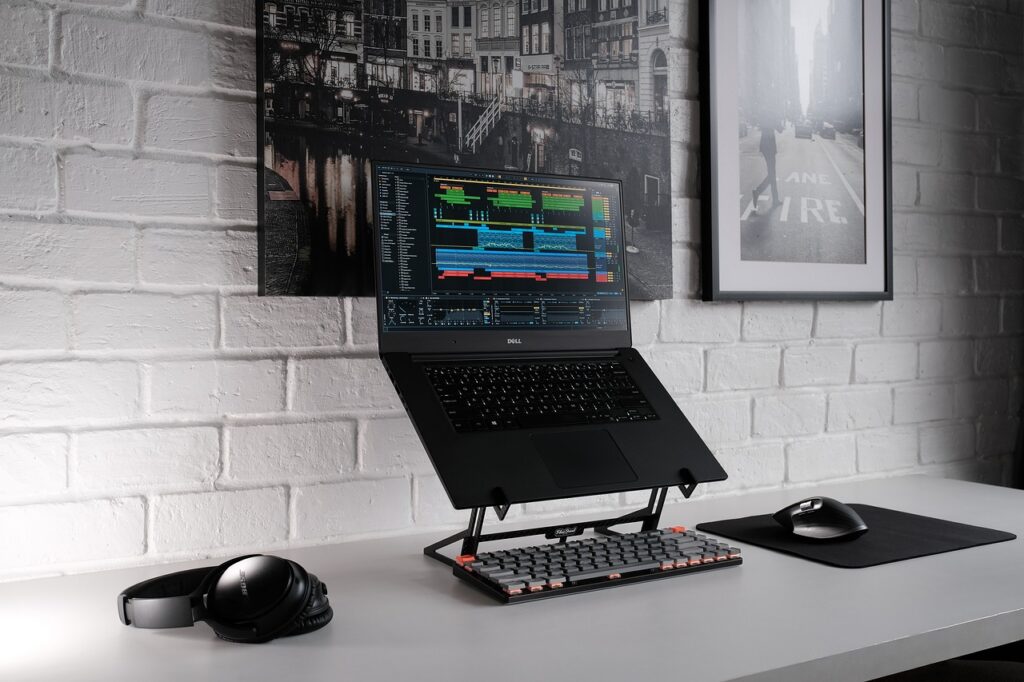
Laptop: Powerhouse For Your Setup
Your laptop is the command centre for your DJ setup, so it’s essential to choose the right one. You’ll need a laptop with a fast processor, plenty of RAM, and a large hard drive to store your music library. A high-quality sound card is also crucial, as it ensures that your music sounds clear and powerful.
When it comes to connecting your equipment, make sure your laptop has enough USB ports to accommodate all your devices. A backup hard drive is also a good investment to keep your music safe and secure.
But choosing the right laptop is just the beginning. You’ll also need to make sure it’s optimised for DJing. This means keeping your software up to date and maintaining your laptop’s performance.
Close any unnecessary applications or programs to free up resources and ensure your laptop runs smoothly while you’re DJing. You may also want to disable Wi-Fi and Bluetooth to prevent any interruptions or interference.
It’s also a good idea to create backups of your music library in case anything happens to your laptop. Use cloud storage or an external hard drive to keep your music safe and accessible.
Overall, your laptop is the powerhouse of your DJ setup, so make sure you choose one that meets your needs and is optimised for DJing. Keep it updated and maintained, and don’t forget to back up your music library. With the right laptop, you’ll be able to deliver an unforgettable performance every time.
Be sure to click here for my take on the best laptops for DJing in 2024!
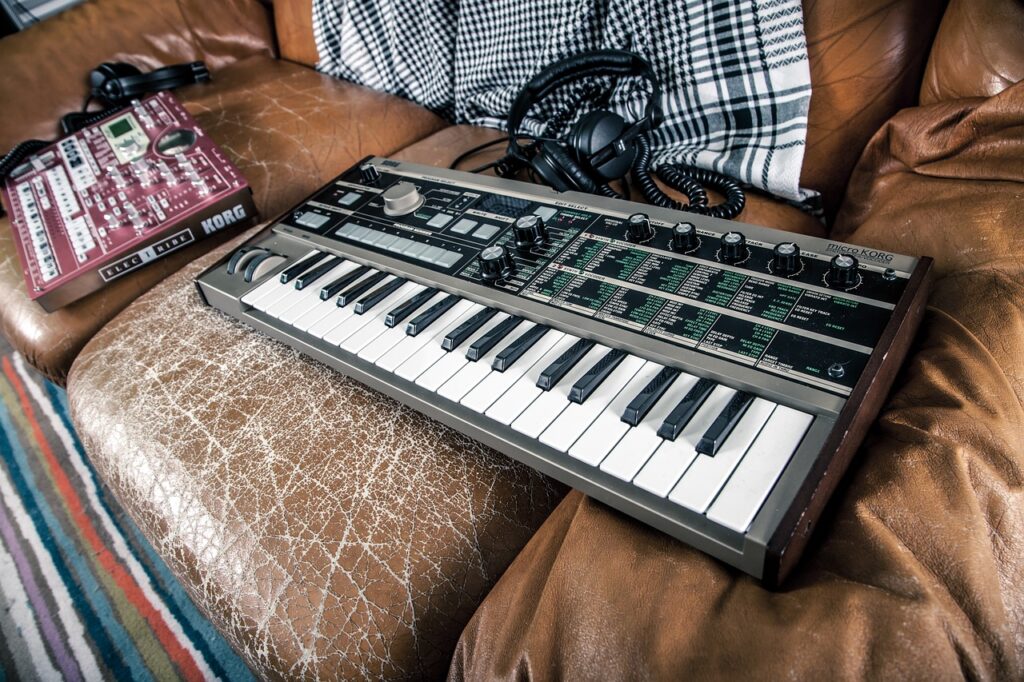
DJ Furniture: Setting Up Your Workspace
When it comes to setting up your DJ workspace, having the right furniture can make all the difference. You’ll want a sturdy table or desk to provide a stable surface for your equipment. But don’t forget about ergonomics – a DJ stand or laptop stand can raise your equipment to the right height and help prevent back and neck strain.
Look for furniture that is easy to assemble and disassemble, as you may need to transport it to gigs. Folding tables or stands are a good option, as they can be easily stored and transported.
If you plan on using vinyl records, you’ll also need a record storage solution. Record crates or shelves are a great way to keep your vinyl organized and easily accessible.
Lastly, consider the aesthetics of your setup. You want to create an environment that’s both functional and visually appealing. Invest in some LED lighting or decorative elements to add some flair to your setup.
Overall, the right DJ furniture can help you create a comfortable and efficient workspace. Look for furniture that’s easy to transport, ergonomically designed, and visually appealing. With the right setup, you’ll be able to focus on your music and deliver an unforgettable performance.
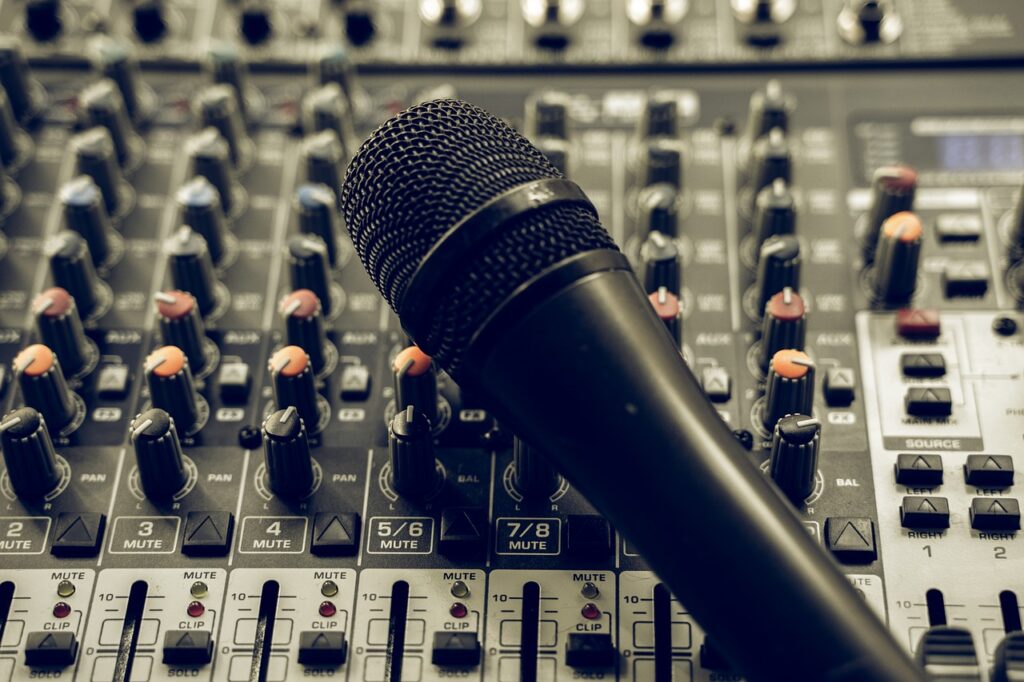
Microphone: For Announcements and More
A microphone can be a really handy tool for DJs, whether you’re making announcements or interacting with your audience. But what kind of microphone should you get?
Look for a microphone with a cardioid polar pattern. This means it picks up sound from the front while rejecting sound from the sides and rear. This helps to reduce feedback and background noise, which is especially important in noisy environments like clubs or parties.
When it comes to choosing a microphone, there are a few other things to consider. First, you’ll want to make sure it’s compatible with your mixer or controller. Check the input options on your equipment and choose a microphone that will work with them.
You’ll also want to think about the type of microphone you want. Dynamic microphones are rugged and durable, and can handle high sound pressure levels. They’re great for live performances and can handle being dropped or bumped. Condenser microphones are more delicate and require a power source, but they offer better sensitivity and sound quality.
Finally, consider the size and weight of the microphone. A small and lightweight microphone is easier to handle and transport, but may not offer the same level of sound quality as a larger, heavier microphone.
Overall, a microphone can be a really useful tool for DJs. Look for one with a cardioid polar pattern, check for compatibility with your equipment, and consider the type, size, and weight of the microphone. With the right microphone, you’ll be able to make announcements and interact with your audience like a pro!

Accessories: The Small Things Matter
When it comes to DJing, the small accessories can make a big difference in your setup. Cable ties, for example, can help keep your cables organised and tangle-free, making it easier for you to focus on your music. A surge protector is also a must-have to protect your equipment from power surges and voltage spikes. Trust us, the last thing you want is for your gear to get fried during a performance!
An extension lead is another small accessory that can come in handy, especially if you need to plug in multiple devices. With an extension lead, you can make sure all your equipment is powered up and ready to go.
Other small accessories to consider include a laptop stand or mouse pad to make it easier to use your laptop while DJing. A USB hub can also be useful if you need to connect multiple devices to your laptop.
Another accessory to keep in mind is a carry case or bag for your equipment. This will make it easier for you to transport your gear to gigs, while also protecting it from bumps and scratches.
Overall, while they may seem small, these accessories can make a big difference in the success of your DJ setup. Take some time to think about what accessories you need and invest in the ones that will help you perform at your best.
